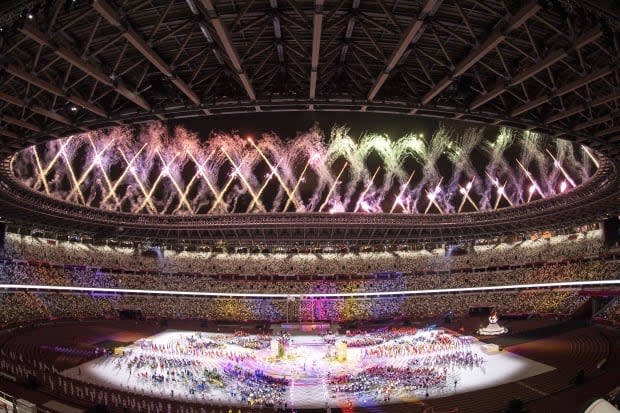'Arigato, Tokyo': Paralympic flame extinguished as Games held against the odds conclude

The curtain fell on a uniquely memorable Tokyo 2020 Paralympic Games on Sunday following closing ceremonies.
Wheelchair racer Brent Lakatos led Canada's team as flag-bearer ahead of the flame being extinguished at a Games that truly occurred against all odds.
Andrew Parsons, president of the International Paralympic Committee, reflected briefly on the difficult road to Tokyo 2020.
"There were many times when we thought these Games could not happen ... There were many sleepless nights," he said.
WATCH | Tokyo 2020 Paralympic closing ceremony (ASL):
"After eight amazing years, I can't believe our time is almost done. What a time, what a sport, what a Games. ... All I can say is, arigato, Tokyo!"
The concept underlying Sunday's closing ceremony was "Harmonious Cacophony." Organizers referred to the theme as a "world inspired by the Paralympics, one where differences shine."
Lakatos entered the stadium wearing a "Canadian tuxedo," with the country's flag attached to his wheelchair.
Lakatos, a 41-year-old wheelchair racer from Dorval, Que., took on the honour of bearing the flag merely hours after competing in his last race in Tokyo.
The athlete was the final Canadian to compete and claimed a fourth-place finish in the men's T54 marathon. He had captured four silvers at these Games, increasing his career Paralympic medal count to 11.
A contingent representing Afghanistan was among the first flags to enter the stadium as the ceremony got underway.
Following the entry of national flags, the event introduced I'mPOSSIBLE — an education program developed by the Agitos Foundation, the International Paralympic Committee's development arm. A brief presentation saw three schools (two from Japan, one from overseas) and two Paralympic athletes recognized for their contributions toward inclusion.
Before the harmonious cacophony commenced, the many volunteers who helped Tokyo 2020 materialize were acknowledged with a rousing round of applause.
The harmonious cacophony presentation included various performers helping to build the city where difference shines, before musical acts began while others mimicked dancing in the streets in celebration.
After the lowering of the Paralympic flag, it was time to complete the handover portion of the ceremony, setting the table for Paris 2024.
Speeches were conducted by Parsons and Seiko Hashimoto, president of the Tokyo organizing committee.
"I believe that we have reached the end of Games without any major problems," Hashimoto said.
A moving rendition of What a Wonderful World took place prior to the extinguishing of the Paralympic flame.
Medal count
Canada closes out the games with 21 medals in total: five golds, 10 silvers, and six bronze won by 16 athletes.
Eight of those were won in the pool at the Tokyo Aquatics Centre. Para swimmer Aurélie Rivard leaves Tokyo with five podium finishes, one of these achieved alongside other Canadian women in the 4x100-metre freestyle relay.
Eight other medals fell in the realm of athletics, three in track cycling, one in judo and one in the triathlon.
The medal in judo, a silver, was won by Canada's opening ceremony flag-bearer Priscilla Gagné.
Canada finishes 23rd in the standings and has the 19th-most medals at the Games.
China tops the standings with a massive haul of 207 medals, 96 of those gold. Great Britain takes the second-place spot with 124 medals (41 gold.)
Meanwhile, the United States earned 104 medals — short of the Russian Paralympic Committee's total of 118 — the U.S. won more gold and silver medals, putting the Americans in front.

 Yahoo Sports
Yahoo Sports 